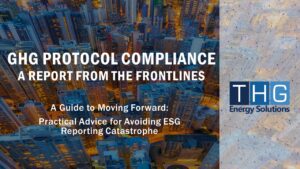
A Guide to Moving Forward: Practical Advice for Avoiding ESG Reporting Catastrophe
In case you missed it, the Security and Exchange Commission (SEC) announcement for proposed rules for disclosure of greenhouse gas emissions on March 21, 2022. The proposed rule is 506 pages and subject to a 60-day comment period. We don’t intend to provide detailed analysis, but here’s what every energy or sustainability professional needs to know.
The press release has two important summaries worth quoting:
The Securities and Exchange Commission today proposed rule changes that would require registrants to include certain climate-related disclosures in their registration statements and periodic reports, including information about climate-related risks that are reasonably likely to have a material impact on their business, results of operations, or financial condition, and certain climate-related financial statement metrics in a note to their audited financial statements. The required information about climate-related risks also would include disclosure of a registrant’s greenhouse gas emissions, which have become a commonly used metric to assess a registrant’s exposure to such risks.
The proposed rules also would require a registrant to disclose information about its direct greenhouse gas (GHG) emissions (Scope 1) and indirect emissions from purchased electricity or other forms of energy (Scope 2). In addition, a registrant would be required to disclose GHG emissions from upstream and downstream activities in its value chain (Scope 3) if material or if the registrant has set a GHG emissions target or goal that includes Scope 3 emissions.
Depending upon the size of the organization “Registrant Type,” this will impact financial reporting for scope 1 and 2 emissions in 2024-26 fiscal years. Of course, many institutions are already organizing and reporting on the proposed standards. If your organization works with larger companies, you may already find yourself in the supply chain part of a requirement.
It’s a safe bet that if you’re in the public markets for capital, bank borrowing, serving large or mid-sized companies or public entities, have board members, employees, or stakeholders with environmental social governance (ESG) concerns, you’re impacted by these requirements. That’s basically everyone.
ESG compliance requirements span broadly across a company. We want to focus on data preparedness, specifically around the data gathering requirements for carbon accounting and impacts. Fast facts about Scope 1 and Scope 2 Greenhouse Gas (GHG) data preparedness:
Utility Data is Hard to Manage & Most Organizations Aren’t Ready
- Scope 1 (onsite) emissions often include natural gas, propane, steam, diesel, and in some cases industrial process gases. Although payment amounts on utility invoices and fuel purchases may have been tracked in accounting systems, the quantities, units of measure, and fuel type descriptions and facility data are not reliably captured. Often, leased facilities are material to corporate carbon accounting, with no available consumption data.
- Scope 2 (purchased electricity) emissions have two components 1) location-based emissions based upon the average grid emissions determined by the EPA, and 2) market-based emissions – any electricity purchasing or sourcing decisions that vary from average grid emissions. This includes renewable energy credits (RECs), solar and wind PPAs, installed DERs, renewable energy utility tariffs, and other electricity supply alternatives. THG’s works directly with suppliers, brokers, consultants, and energy managers to incorporate and properly assign market-based emissions from contractual instruments and renewable sources.
THG’s GHG reporting platform provides turnkey data support for Scope 1 and 2 emissions and fully complies with the Greenhouse Gas Protocol’s “Corporate Standard” that undergirds all international carbon accounting requirements including the alphabet soup of standards and frameworks, like GRI, GRESB, CDP, S&P Global, SASB, TCFD, IIRC, etc.
Most ESG Enterprise Platforms Require the Client to Gather Their Own GHG Data
Assuming the purchase of an ESG reporting solution solves the data gathering and compliance needs can be fatal. Most ESG reporting software puts the burden of utility data entry on the customer. That’s because the GHG data-gathering and compliance is difficult, complex, and gritty. For almost 20 years, THG has been gathering this same utility, energy, and facility data for utility bill payment, processing, energy efficiency and benchmarking. Our RESTful API can integrate with third-party enterprise ESG solutions. We work closely with some of the most sophisticated clients, energy companies, consultants, and enterprise platforms.
Base Year Data Quickly Becomes Unavailable – Get Started Now with Data Preparedness
We’ve all seen GHG reduction goals publicly stated by public and private institutions. “We’re going to reduce our carbon footprint by 50% before 2030.” What’s the baseline? The SEC’s guidelines require specific reporting requirements to cite statements like this. Electronic access to utility and supplier portals starts to disappear quickly after 12 months. The process of pulling paper copies of utility bills from file cabinets and manually entering them in an accurate, complete, timely, and auditable manner is somewhere inside the seventh circle of Dante’s inferno.
Energy Transition Planning: After Carbon Accounting, Look to Efficiency, Renewables & Sustainability
This process of managing utility data and meeting the emissions compliance can be cumbersome and expensive. In the right hands and with the right execution, better energy data drives better decisions, creates savings, and efficiencies. THG works closely with energy partners to execute on a broad number of energy efficiency, demand management, and integrated Distributed Energy Resources that drive savings and reduce emissions. In many cases, these advanced energy management savings more than pay for all the ESG reporting requirements.
Although it’s an older concept, when properly executed, GHG reporting combined with advanced energy management pays for itself and can still improve the triple bottom line (people, profit, planet).
If you’re looking for practical, pragmatic, and proven solutions, please contact Chad Burden – cburden@thgenergy.com or 918.858.4943
The broader THG Energy Team can be reached @ contactus@thgenergy.com
